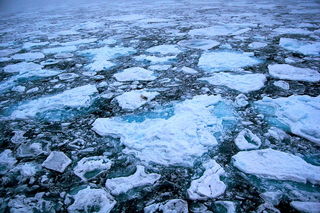Environment
On Mourning Climate Change
The psychological crisis that accompanies our changing climate.
Posted December 16, 2018

When 15-year-old Greta Thunberg addressed a global climate change conference in Poland recently, she stated that, “We have to speak clearly, no matter how uncomfortable that may be.” Speaking on behalf of Climate Justice Now, a global coalition of climate justice organizations, the young Swedish activist was piercing in her indictment of world leaders gathered for the COP24 Conference. Thunberg accused world leaders of putting greed above the interests of future generations, noting that leaders are “too scared of being unpopular.” Putting the existential risk posed by a deteriorating biosphere in clear focus, she pointed out that we “cannot solve a crisis without treating it as a crisis.” Yet here we find ourselves, sobered by Thunberg’s speech yet unable to speak clearly about the predicament we face—a crisis so uncomfortable as to render many of us inept and paralyzed, notwithstanding whatever public expressions of fear and anger we may utter.
Climate change is a psychological crisis, whatever else it is. The collective threat posed by rising sea levels and increased carbon in the atmosphere—indeed, the shrinking of what might be livable real estate on planet Earth—seems more than we can manage with the psychological tools at our immediate disposal. As Bill McKibben said in a recent New Yorker essay, the earth has begun to shrink, “under our feet and in our minds.” Psychoanalytic theory helps us understand how we manage overwhelming emotions—affects that are surely engendered by a changing climate. Our self-cures may range from denial and confabulation to rationalization and intellectualization. Such defenses solve the problem of keeping the crisis at bay, if not fully out of consciousness. The psychoanalyst Sally Weintrobe has suggested three forms of denial that may come into play when it comes to engaging with climate change: denialism, disavowal, and negation. Denialism is easily recognized and is the intentional spreading of misinformation for political, ideological, or commercial interests. This is defensiveness at its most cynical and is found in political campaigns or corporate white papers. Negation—saying something is “not true” when it is true—helps us defend against anxiety and loss. It is a kind of Kübler-Ross-stage-of-grief form of denial, which may be a first step in coming to accept reality.
Disavowal presents a more serious problem. Here we are simultaneously knowing and not-knowing. On the one hand, reality is acknowledged and accepted; on the other hand, with a kind of psychological alchemy, its significance is severely downplayed. We are at once mortified at the Camp Fire, the most destructive wildfire in California history, while also not thinking too deeply about it in a way that makes us uncomfortable. One eye opened and one eye closed. In Weintrobe’s view, this becomes particularly dangerous over time because our defenses become increasingly stronger and more entrenched, alongside the mounting unconscious anxiety. We gaslight ourselves into an alternate reality in order to manage the underlying buildup of negative emotions.
Psychological researcher Renee Lertzman introduced the idea of “environmental melancholia” to describe this state of unprocessed grief over the effects of climate change. This is not apathy or lack of awareness. Indeed, we feel too much and too intensely, then feel too paralyzed and powerless to act. What we are mourning, when it comes to the climate, is vague and difficult to pinpoint—unlike mourning the loss of a person, for example. Furthermore, we are pitted against cultural barriers that may make such acknowledgement difficult. We are also mourning a loss that has not yet been fully realized.
The temporal dimension of the climate crisis poses an additional psychological challenge for us. Not only are we grieving a loss that has not yet occurred, but climate change itself is happening in such slow motion. We see only its most obvious effects, like the recent fires in California and the merciless hurricanes from the warming Atlantic. The melting of Arctic sea ice is unceremonious. The usual identifying features of a threat are not easily detected, given our psychological machinery. It is all happening too slow to get our attention. This nebulous state of affairs leaves us vulnerable to a kind of assimilation bias where we tweak information so that it conforms to our existing values and beliefs. Still, there is only so far that behavioral economics and cognitive neuroscience can take us in making needed changes.
As a starting point, we might acknowledge our collective suffering and ambivalence when it comes to climate change. In the Freudian story, mourning is viewed as an achievement rather than a setback. Indeed, we need to mourn the loss of our dreams and illusions, and pay attention to the myriad, often contradictory emotions we have about our changing climate. Such psychological work—both within ourselves and in our relationships—can free us up to take positive action.
References
Lertzman, Renee. (2016). Environmental Melancholia: Psychoanalytic Dimensions of Engagement. London: Routledge.
Weintrobe, S. (2012). Engaging with Climate Change: Psychoanalytic and Interdisciplinary Perspectives. London: Routledge.


